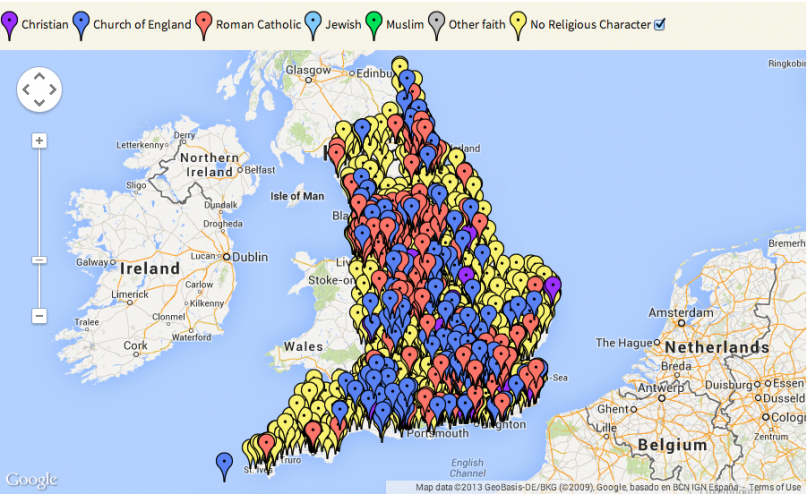England’s a funny place. I’ve lived here long enough to stop questioning why grocery stores close so early, why hot and cold water come from separate faucets, why people put corn on pizza, and just what makes Marmite so delicious. But when it comes to the role religion plays in state affairs, I’m still scratching my head.
Some issues of church-state entanglement seem relatively harmless. The Queen is technically the head of the Anglican church, which is technically the state religion. Oh, and she can’t marry a Catholic. These points may seem antiquated (as do most things in Britain), but they’re probably not grounds for a revolution.
Perhaps more problematic is the fact that 26 seats in the House of Lords are reserved for Church of England officials and that state-funded schools can refuse to admit children based on their parents’ religions.
One-third of state-funded schools in England and Wales are faith schools, meaning they can lead kids in prayer and limit religious studies to their own beliefs.
The Fair Admissions Campaign wants all state-funded schools to be open to all children, regardless of religion. The campaign recently published a map of every mainstream state-funded secondary school in England color-coded by faith. Christian, Church of England, Roman Catholic, Jewish, Muslim, and other faith schools, including Sikh and Greek Orthodox academies, along with those with no religious mandate are highlighted across the country.

The Fair Admissions Campaign’s map of English secondary schools by religious and socio-economic selection.
In Kensington and Chelsea, a particularly wealthy borough of London, local schools are allowed to select 60 percent of students based on religious grounds.
Ted Cantle, a supporter of the Fair Admissions Campaign, is concerned by the current state of affairs:
“segregation by faith and social class has been added to that of ethnicity. And the worst culprits seem to be the very institutions that claim to bring us together – religious schools. Furthermore, the situation is one of continual decline as more and more faith schools, with free and independent admission policies, are established to balkanise children’s education. Rather than learning about each other, schools are creating more and more boundaries, which tell pupils that they have such inherent differences that it is not possible to share the same classroom.”
Some parents who want their kids to join the best state-funded schools, many of which happen to be faith schools, will do whatever it takes to work within and around admission policies that discriminate based on religion.
The Fair Admissions Campaign lists media reports of children denied access to particular schools because their parents were too ill to attend church or didn’t attend often enough. Testimonies of families who feigned religious belief to get into a good school are also listed. Demonstrating that these issues are still very much alive, the prestigious state-funded Roman Catholic school where former prime minister Tony Blair sent his sons was recently forced to stop basing admissions on how involved parents were in helping the church.
The British Humanist Association, which supports the Fair Admissions Campaign, estimates that 16 percent or 1.2 million school placements are subject to admissions criteria that are religiously selective. In an email announcing the campaign’s new research, Andrew Copson, Chief Executive of the BHA, wrote:
“We at the British Humanist Association don’t think the state should fund religious schools at all, due to the discriminatory nature of their admissions, employment and curriculum policies. The Fair Admissions Campaign, which aims to deal with the first of those three issues, is hugely important, and today’s tool exposes the damaging effects such admissions policies have on community cohesion like never before.”
What do you think? Are England’s school admission policies creating a more divided society? Should the state continue to fund faith-based schools? Chime in with a comment (or two) below, and play around with the new map here.





